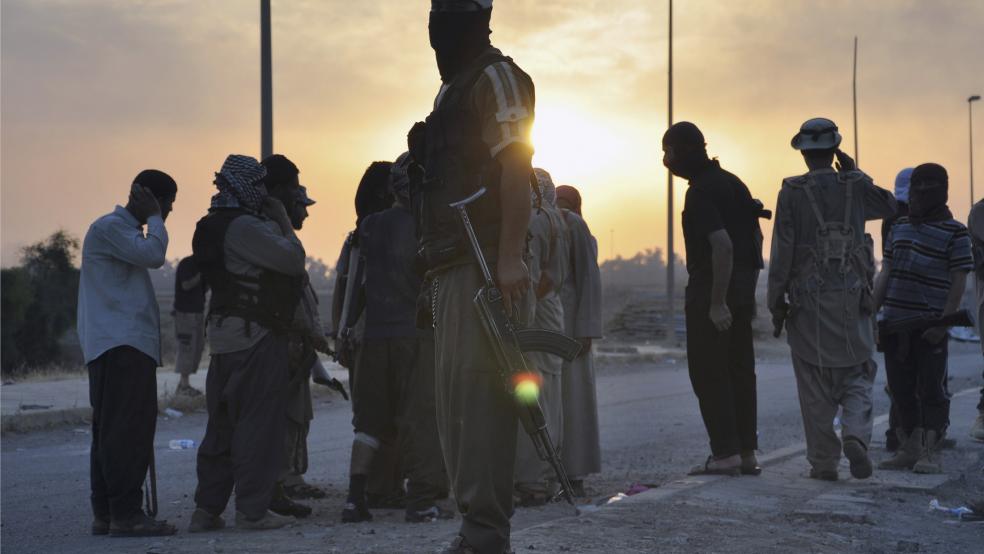With the radical Islamic State of Iraq and Syria (ISIS) taking over four more towns in western Iraq and along the Syrian border over the weekend, U.S. policymakers are arguing over how grave a threat the group poses to the United States.
In an interview with Norah O’Donnell of CBS News, part of which aired on Face the Nation Sunday, President Obama said that while ISIS is a dangerous and violent group, it poses only a “a medium and long-term threat” to the United States rather than an immediate danger.
Related: Iraq Is Just the Beginning for ISIS
“I think it’s important for us to recognize that ISIS is just one of the organizations we have to stay focused on,” the president said, adding that the U.S. “can’t play Whack-a-Mole” in the Middle East, sending troops in wherever radical groups pop up.
Others are more concerned, believing that ISIS Is looking more and more like Al Qaeda did in the years leading up to the September 11 attacks, but with a crucial difference.
Like Al Qaeda, ISIS has plenty of money and, with its takeover of much of Iraq, a safe place to operate. What it has that Al Qaeda did not is a large number of members from the U.S. and other Western countries who have the ability to travel freely in the West.
The heads of both Congressional Intelligence Committees said they were concerned about the group’s ability to target the U.S. and its allies in Europe.
Related: Murderous ISIS May Have a Secret Weapon -- Bribery
ISIS is recruiting in Europe and the United States, Senate Intelligence Committee Chair Diane Feinstein warned on CNN’s State of the Union, and those recruits fighting with the group are prime candidates for further radicalization.
There are “at least 100” American passport-holders fighting with ISIS, she said, and an unknown number from European countries whose residents are free to travel to the United States without obtaining a visa.
“There will be plots to kill Americans,” Feinstein said.
On Face the Nation, House Intelligence Committee Chair Mike Rogers (R-MI), said ISIS is “well armed, well financed, and they have lots of free space in which to operate and train. We know that they have intentions to send people who have shown up with Western passports back to the United States and back to Europe. That is as dangerous as it gets. Now is it six months, three months, or a year? We’re not sure. But I wouldn’t wait. It’s not whack-a-mole. It’s in our national security interest.”
Related: Terrorist Tycoons on a Horrific March to Baghdad
There were many calls for the president to do something about ISIS on Sunday. Sen. Marco Rubio (R-FL) said, “We will either deal with ISIS now, or we will deal with them later. And later they will be stronger and more difficult to reach.”
What to do about ISIS, of course, is an extremely complicated question. The group is fighting against Bashar Al-Assad’s regime in Syria, which makes it an indirect ally of the United States in that conflict. But its attacks on the regime in Iraq, which has been supported by the U.S., place it squarely in opposition to the U.S. in that country.
Further complicating matters is that the group is closely aligned with Islam’s Sunni denomination, and opposes the Shiite denomination, which, while much smaller globally, holds power in Iraq and neighboring Iran.
Iran, which the U.S. has hit with crippling sanctions over its nuclear development program, has moved troops into Iraq to counter ISIS and support the Shia-friendly Iraqi central government.
Related: Iraq Could Become a Three-Headed Monster
The Obama administration has said publicly that it is not interested in providing any assistance to the government of Iraqi Prime Minister Nouri al-Maliki until it makes the government a more religiously inclusive one – meaning that Sunnis in Iraq must be given some of the power currently monopolized by the Shia.
Unless that happens, any U.S. attacks on ISIS would likely be interpreted as a statement of solidarity with one side in a brewing religious war.
Col. Steven Ganyard, a former fighter pilot who later served as Deputy Assistant Secretary of State for Political Military Affairs said on ABC’s This Week, “As soon as we drop that first bomb or shoot that first Hellfire [missile], we have picked sides. And we need to make sure that we’re picking sides for an Iraqi government that’s inclusive and that we aren’t making a broader determination of Sunni versus Shia.”
Former Vice President Dick Cheney appeared on ABC to continue his angry critique of the Obama administration’s handling of the Middle East, warning of “big trouble” in the years ahead because of the withdrawal of U.S. troops from Iraq and Afghanistan.
Related: Could Hillary Clinton Have Prevented the Crisis in Iraq?
As usual, when asked whether the Bush administration, in which he was a key figure, deserved any criticism for the fallout from the war it started in Iraq, he avoided the question.
While there was little evident agreement on the road forward, retired General James Cartwright, the former Vice Chairman of the Joint Chiefs of Staff, made one point that should be clear to all concerned when it comes to ISIS.
Pointing out that the group controls a “commanding position” of 300 to 400 kilometers along the Euphrates River, Cartwright said, “It is likely that this is a defining moment for them in that, if they can hold these positions and lock them down, it’s unlikely that Iraq as we envisioned it will ever return.”
Top Reads from The Fiscal Times





